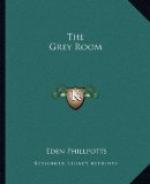But here was one so insignificant and so undersized that it seemed impossible to imagine him a famous Englishman. His very voice, in its level, matter-of-fact tones, added to the suggestion of mediocrity.
Sir Walter found, however, that the detective did not undervalue himself. He was not arrogant, but revealed decision and immense will power. From the first he imposed his personality, and made people forget the accidents of his physical constitution. He said very little during breakfast, but listened with attention to the conversation.
He observed that Henry Lennox spoke seldom, but studied him unobtrusively, as a man concerning whom he specially desired to know more. Hardcastle proved himself well educated; indeed, his reading, studiously pursued, and his intellectual attainments, developed by hard work and ambition, far exceeded those of any present.
The clergyman returned to his own ground, and expressed his former opinions, to which Hardcastle listened without a shadow of the secret surprise they awoke in him.
“The Witchcraft Act assumes that there can be no possible communication between living men and spirits,” he said in answer to an assertion; whereon Septimus May instantly took up the challenge.
“A fatuous, archaic assumption, and long since destroyed by actual, human experience,” he replied. “It is time such blasphemous folly should be banished from the Statute Book. I say ‘blasphemous’ because such an Act takes no cognizance of the Word of God. Outworn Acts of Parliament are responsible for a great deal of needless misery in this world, and it is high time these ordinances of another generation were sent to the dust heap.”
“In that last opinion I heartily agree with you,” declared the detective.
Henry ventured a quotation. He was much interested to learn whether Hardcastle had any views on the ghost theory.
“Goethe says that matter cannot exist without spirit, or spirit without matter. Would you sub-scribe to that, Mr. Hardcastle?”
“Partially. Matter can exist without spirit, which you may prove by getting under an avalanche; but I do most emphatically agree that spirit cannot exist without matter. ’Divorced from matter, where is life?’ asks Tyndall, and nobody can answer him.”
“You misunderstand Goethe,” declared Mr. May. “In metaphysics—”
“I have no use for metaphysics. Believe me, the solemn humbug of metaphysics doesn’t take in a policeman for a moment. Juggling with words never advanced the world’s welfare or helped the cause of truth. What, for any practical purpose, does it matter how subjectively true a statement may be if it is objectively false? Life is just as real as I am myself—no more and no less—and all the metaphysical jargon in the world won’t prevent my shins from bleeding wet, red blood when I bark them against a stone.”
“You don’t believe in the supernatural then?” asked Mr. May.




